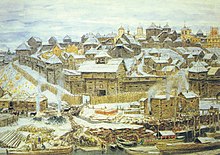For other uses, see Moskal (disambiguation).


Moskal is a designation used for the residents of the Grand Duchy of Moscow from the 12th to the 15th centuries.
It is now sometimes used in Belarus, Ukraine, and Poland, but also in Romania, as an ethnic slur for Russians. The term is generally considered to be derogatory or condescending and reciprocal to the Russian term khokhol for Ukrainians. Another ethnic slur for Russians is kacap in Polish, or katsap (кацап) in Ukrainian.
History and etymology
Initially, as early as the 12th century, moskal referred to the residents of Muscovy, the word literally translating as "Muscovite" (differentiating the residents of the Grand Duchy of Moscow from other East Slavs such as people from White Ruthenia (Belarusians), Red Ruthenia (Ukrainians), and others). With time, the word became an archaism in all the East Slavic languages, and survived only as a family name in each of those languages—see below.
The negative connotation in Ukraine came in around the late 18th-early 19th centuries in the form of an ethnic slur labelling all Russians. At that time, since the 1654 Pereiaslav Agreement of Cossacks with Moscow the majority of Russians in Ukrainian lands were soldiers of the Imperial Russian Army (and in fact at that time the term "moskal" was synonymous with the word "soldier"), as well as Russian bureaucrats, Russian nobles that were granted estates there, and merchants. All these categories were disliked by the locals.
Cultural influence
The "Moskal" is a stock character of the traditional Ukrainian puppet theatre form, vertep.
It also gave rise to a number of East Slavic family names: Moskal, Moskalyov, Moskalenko, Moskalik, Moskalyuk, Moskalchuk, Moskalyonok.
See also
Notes
-
- Russian and Ukrainian: москаль
- Belarusian: маскаль
- Polish: moskal
- Romanian: muscal
- Hungarian: muszka
- Lithuanian: maskolis
References
- Alexander Mikaberidze (2011). Ilya Radozhitskii's Campaign Memoirs. Lulu. p. 10. ISBN 978-1-105-16871-0.
- Ryazanova-Clarke, Lara (2014). The Russian language outside the nation. Edinburgh. p. 74. ISBN 9780748668465.
{{cite book}}: CS1 maint: location missing publisher (link) - Radozhit︠s︡kiī, Ilʹi︠a︡ Timofeevich (2011). Campaign memoirs of the artilleryman. Tbilisi, Georgia. p. 10. ISBN 978-1-105-16871-0.
{{cite book}}: CS1 maint: location missing publisher (link) - Benjamin Harshav (1986). American Yiddish Poetry: A Bilingual Anthology. University of California Press. p. 559. ISBN 978-0-520-04842-3.
- Thompson, Ewa Majewska (1991). The Search for self-definition in Russian literature. Vol. 27. John Benjamins Publishing Company. p. 22. ISBN 9027222134.
- Edyta M. Bojanowska (2007) "Nikolai Gogol: Between Ukrainian And Russian Nationalism" ISBN 0-674-02291-2, p. 55: "In the 'low', folksy world of the provincial narrators, a Russian is a moskal ("Muscovite")", a foreigner and an intruder, at best a carpetbagger, at worst a thief in league with the devil."
- Orest Subtelny, Ukraine: A History, pp. 274-275
- Прыгунов М. "Драма Вертепная", Литературная энциклопедия 1929—1939, vol. 3. Moscow: Изд-во Ком. Акад., 1930, pp. 543—545
- Redefining the Traditional Vertep: An Issue in Ukrainian-Jewish Relations
External links
- (in Ukrainian and Russian) Search query in Russian-Ukrainian dictionaries